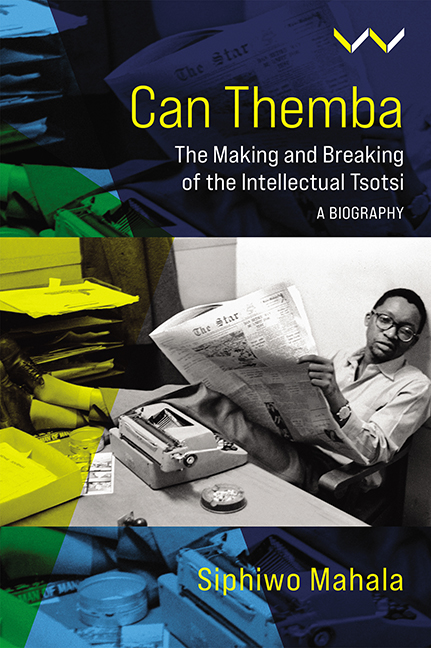Book contents
- Frontmatter
- Dedication
- Epigraph
- Contents
- List of Illustrations
- Acknowledgements
- Introduction
- PART I Death and Birth of a Scribe
- PART II ‘Live Fast and Die Young’
- PART III The ‘Intellectual Tsotsi’
- PART IV Dances with Texts: Writing and Storytelling
- PART V A Writer’s Immortality
- Postscript: The Three Burials of Can Themba
- Notes
- Bibliography
- Index
14 - Intertextuality and the Making of Mr Shakespeare
Published online by Cambridge University Press: 26 May 2022
- Frontmatter
- Dedication
- Epigraph
- Contents
- List of Illustrations
- Acknowledgements
- Introduction
- PART I Death and Birth of a Scribe
- PART II ‘Live Fast and Die Young’
- PART III The ‘Intellectual Tsotsi’
- PART IV Dances with Texts: Writing and Storytelling
- PART V A Writer’s Immortality
- Postscript: The Three Burials of Can Themba
- Notes
- Bibliography
- Index
Summary
Themba's use of Shakespeare to aspects of South Africa is different in quality from [Anthony] Sampson’s. Despite drawing who enters into his service rather than using a ‘Shakespearean world to denote [the] position of an audience member.’
Natasha Distiller — South Africa, Shakespeare,and Post-Colonial Culture (2005), 171The ability to draw from and play with the vast library of texts with which Can Themba furnished his mind via his reading and education (especially his immersion in the Western canon of English literature at Fort Hare) was a trademark of his writing, debate and even everyday discussion.
Such intertextuality, a crucial element in literary apprenticeship, can be defined as the connection or influence that different literary texts have on each other, and it is a major feature of Themba’s writing. Fittingly, it has become a hallmark of critical and creative interaction with his famous short story ‘The Suit’ (see Chapter 15).
Shakespeare was clearly the greatest influence in Themba’s literary output, but many other texts are evoked in his writing: canonical English poets and novelists, African history and oral tradition, the Bible and more are used to comment on his circumstances or to underline a point. Themba's analysis of daily happenings was often informed by the literature he read.
In a single story – in fact, a single paragraph – Themba gives a roll-call of topics, philosophers and writers who shaped his thinking. The piece was sent to Nat Nakasa in 1964 for publication in The Classic magazine, with a note saying he should just call it ‘Quoth He’; it is one of the last stories we know of that Themba wrote while in Swaziland. However, it did not see print until the 2006 publication of Themba's collection of stories. (It is not clear why it was not published in Nakasa's magazine, but it was around this time that Nakasa left South Africa on an exit permit to take up a Nieman Fellowship at Harvard University, dying a year later in New York.)
In this particular passage, Themba invoked a cross-section of influential figures: ‘But too [many] frivolous moods have caught me these days. French Revolutions, St Bartholomew Massacres, a Borgia here, a Nero there, a Medici or a Shaka or a Machiavel [sic], those are peripheries of my imagination. Other ones are Schweitzers, Curries, Socrates, Christs.’
- Type
- Chapter
- Information
- Can ThembaThe Making and Breaking of the Intellectual Tsotsi, a Biography, pp. 171 - 188Publisher: Wits University PressPrint publication year: 2022



